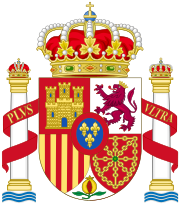 Global Information
Global InformationConstitution of Spain information
| Spanish Constitution | |
|---|---|
 | |
| Created | 31 October 1978 |
| Ratified | 6 December 1978 |
| Date effective | 29 December 1978 |
| System | Parliamentary monarchy |
| Government structure | |
| Branches | 3 |
| Head of state | King |
| Chambers | Bicameral |
| Executive | Government |
| Judiciary | Supreme Court of Spain Audiencia Nacional High courts of justice Court of Auditors Prosecution Ministry |
| History | |
| Amendments | 3 |
| Last amended | 27 September 2011 |
| Location | Congress of Deputies |
| Author(s) | Fathers of the Constitution
|
| Full text | |
Politics of Spain |
|---|
 |
|
The Spanish Constitution (Spanish: Constitución española)[a] is the supreme law of the Kingdom of Spain. It was enacted after its approval in a constitutional referendum; it represents the culmination of the Spanish transition to democracy. It is a written constitution.
The current Constitution was approved in 1978, three years after the death of Francisco Franco. There have been dozens of Spanish constitutions and constitution-like documents in Spain; however, it is "the first which was not imposed by a party but represented a negotiated compromise among all the major parties".[1] It was sanctioned by King Juan Carlos I on 27 December, before it was published in the Boletín Oficial del Estado (the government gazette of Spain) on 29 December, the date on which it became effective. The promulgation of the constitution marked the culmination of the Spanish transition to democracy after the death of general Franco, on 20 November 1975, who ruled over Spain as a military dictator for nearly 40 years. This led to the country undergoing a series of political, social and historical changes that transformed the Francoist regime into a democratic state.
The Spanish transition to democracy was a complex process that gradually transformed the legal framework of the Francoist regime into a democratic state. The Spanish state did not abolish the Francoist regime, but rather slowly transformed the institutions and approved and/or derogated laws so as to establish a democratic nation and approve the Constitution, all under the guidance of King Juan Carlos I of Spain. The Constitution was redacted, debated and approved by the constituent assembly (Spanish: Cortes Constituyentes) that emerged from the 1977 general election. The Constitution then repealed all the Fundamental Laws of the Realm (the constitution of the Francoist regime), as well as other major historical laws and every pre-existing law that contradicted what the Constitution establishes. The constitution takes cues both from older Spanish constitutions as well as from other then-current European constitutions including the provision for a constructive vote of no confidence taken from the German Basic Law.
Article 1 of the Constitution defines the Spanish state. Article 1.1 states that "Spain is established as a social and democratic State, subject to the rule of law, which advocates as the highest values of its legal order the following: liberty, justice, equality and political pluralism. Article 1.2 refers to national sovereignty, which is vested in the Spanish people, "from whom the powers of the State emanate". Article 1.3 establishes parliamentary monarchy as the "political form of the Spanish state".
The Constitution is organized in ten parts (Spanish: Títulos) and an additional introduction (Spanish: Título Preliminar), as well as a preamble, several additional and interim provisions and a series of repeals, and it ends with a final provision. Part I refers to fundamental rights and duties, which receive special treatment and protection under Spanish law. Part II refers to the regulation of the Crown and lays out the King's role in the Spanish state. Part III elaborates on Spain's legislature, the Cortes Generales. Part IV refers to the Government of Spain, the executive power, and the Public Administration, which is managed by the executive. Part V refers to the relations between the Government and the Cortes Generales; as a parliamentary monarchy, the Prime Minister (Spanish: Presidente del Gobierno) is invested by the legislature and the Government is responsible before the legislature. Part VI refers to the organization of the judicial power, establishing that justice emanates from the people and is administered on behalf of the king by judges and magistrates who are independent, irrevocable, liable and subject to the rule of law only. Part VII refers to the principles that shall guide the economy and the finances of the Spanish state, subjecting all the wealth in the country to the general interest and recognizing public initiative in the economy, while also protecting private property in the framework of a market economy. It also establishes the Court of Accounts and the principles that shall guide the approval of the state budget. Part VIII refers to the "territorial organization of the State" and establishes a unitary state that is nevertheless heavily decentralized through delegation and transfer of powers. The result is a de facto federal model, with some differences from federal states. This is referred to as an autonomous state (Spanish: Estado Autonómico) or state of the autonomies (Spanish: Estado de las Autonomías). Part IX refers to the Constitutional Court, which oversees the constitutionality of all laws and protects the fundamental rights enshrined in Part I. Finally, Part X refers to constitutional amendments, of which there have been only three since 1978 (in 1992, when Article #13 was reformed, in 2011, when Article #135 was reformed, and in 2024, when Article #49 was reformed).
Cite error: There are <ref group=lower-alpha> tags or {{efn}} templates on this page, but the references will not show without a {{reflist|group=lower-alpha}} template or {{notelist}} template (see the help page).
- ^ Carr, Raymond (1980). Modern Spain, 1875–1980. Oxford University Press. p. 177. ISBN 9780192158284. OCLC 6555498.